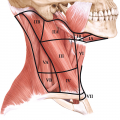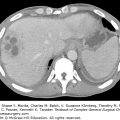The majority of esophageal carcinomas are represented by two histologies: squamous cell carcinoma and adenocarcinoma. Esophageal squamous cell carcinoma (ESCC) is the predominant histological type in Asia. Although treatment strategies differ slightly between Western and Asian countries, surgery traditionally remains the standard therapy for esophageal cancer. However, survival after surgery alone remains poor because of the high rates of local and systemic failure. Thus, multimodality therapies using various combinations of all modalities including surgery, radiotherapy, chemotherapy, and chemoradiotherapy (CRT) have been investigated. In this chapter, we described recent issues regarding multimodality therapy for esophageal cancer in Eastern countries.
A randomized controlled trial of patients with squamous cell carcinoma (SCC) was conducted by the Japan Clinical Oncology Group (JCOG)/Esophageal Oncology Group and compared surgery followed by adjuvant cisplatin/vindesine and surgery alone in 205 patients with SCC.1 No significant difference was observed in 5-year overall survival rates between the two arms; therefore, it was concluded that postoperative chemotherapy added no survival benefit. In another randomized trial performed in Japan, 242 patients with resected SCC of the esophagus were randomized to receive two cycles of postoperative 5-fluorouracil (5-FU)/cisplatin or surgery alone.2 No significant difference was again observed in the 5-year overall survival rates between the two arms. However, the 5-year disease-free survival rate was longer in the adjuvant therapy arm (55% vs. 45%, p = 0.037). Adjuvant therapy, in particular, improved the 5-year overall survival rate in patients with positive lymph nodes. These findings suggested a recurrence-preventive effect in patients with positive lymph nodes, whereas no such effect was noted in those with negative lymph nodes. Although these findings suggested that adjuvant chemotherapy may be beneficial for select patients with esophageal SCC, a meta-analysis including these randomized controlled trials showed no beneficial effect of adjuvant chemotherapy on survival rates.3
A randomized controlled trial of patients with squamous cell carcinoma was conducted by Fok et al,4 in which 130 patients with resected esophageal carcinoma were randomized to receive adjuvant radiotherapy at a dose of 49.5 Gy in 3.5 Gy fractions or observation only. The overall survival of patients after adjuvant radiotherapy was 8.7 months, which was shorter than that of 15.2 months for the observation group (p = 0.02). In a prospective randomized study performed by Xiao et al,5 495 patients with resected ESCC were randomized to receive adjuvant radiotherapy at a dose of 50 to 60 Gy in 2 Gy fractions or surgery alone. The results obtained showed no significant difference in the overall 5-year survival rates between the two groups (31.7% with surgery alone vs. 41.3% with adjuvant radiotherapy; p = 0.447). However, the addition of adjuvant radiotherapy improved the overall 5-year survival rate of stage III patients (from 13.1 to 35.1%; p = 0.0027). A meta-analysis including these controlled trials showed no significant improvement in survival rates after postoperative irradiation.3 Thus, based on recent findings, adjuvant radiotherapy may be recommended for select patients with advanced esophageal SCC.
A small randomized trial of patients with squamous cell carcinoma was conducted by Tachibana et al,6 in which 45 patients with R0 resected esophageal carcinoma were randomized to receive postoperative 5-FU/cisplatin or radiotherapy at a dose of 50 Gy in addition to the same chemotherapeutic regimen. No significant difference was observed in overall 5-year survival rates (38% vs. 50%; p = 0.97). No randomized trial has compared surgery with or without adjuvant chemoradiation. Therefore, there is no evidence to demonstrate that adjuvant postoperative chemoradiation improves the survival rate of patients with esophageal SSC in Eastern countries.
Several treatments other than chemotherapy and radiotherapy are now being investigated in order to improve long-term survival rates. One of these treatments is an immunotherapeutic approach. In a phase I/II trial performed by Toh et al, 11 patients with advanced or recurrent esophageal carcinoma received the locoregional administration of autologous lymphocytes stimulated with autologous tumor cells and interleukin (IL)-2. One patient achieved a complete response, while a partial response was observed in three patients.7 In a phase I trial performed by Kono et al, 10 patients with stage III or IV ESCC were administered a peptide vaccine. One patient with hepatic metastasis achieved a complete response that lasted 7 months, one had an objective response for all lung metastatic lesions, and a stable disease condition was observed in three patients for at least 2.5 months.8 Immunotherapeutic approaches are still being developed; therefore, there is no evidence to show the beneficial effects of adjuvant immunotherapy on the survival rates of patients with esophageal cancer.
The rationale for preoperative neoadjuvant therapy is the expectation that it will reduce the size of the primary lesion, control lymph node metastasis and micrometastasis, and allow down-staging prior to surgical resection, leading to better long-term results of the surgery. In addition to down-staging, preoperative neoadjuvant therapy is also advantageous because it allows the sensitivity of the patient’s tumor to chemotherapy and radiotherapy to be determined from a histological investigation of the resected specimen. On the other hand, preoperative neoadjuvant therapy has the following potential drawbacks: drug resistance may be induced, local control is delayed and metastatic spread may be facilitated, surgical manipulations may be more difficult, and the risk of postoperative complications might increase in patients who received preoperative neoadjuvant therapy.
The effectiveness of preoperative neoadjuvant therapy over surgery alone has been demonstrated extensively in randomized controlled trials In Europe and North America.9 Based on these findings, preoperative CRT and surgery were recommended as a standard therapy in the clinical practice guidelines of the NCCN (National Comprehensive Cancer Network) (http://www.nccn.org/professionals/physician_gls/f_guidelines.asp#site).
However, the predominant histological type of esophageal carcinoma in these studies was mainly adenocarcinoma and not squamous cell carcinoma in Western countries. The surgical procedures performed and outcomes achieved are known to differ between Eastern and Western countries. Therefore, prudence is required when interpreting the results of these controlled trials in Eastern countries.
Few randomized control studies in Eastern countries have examined neoadjuvant chemotherapy and surgery versus surgery alone (Table 89-1).10 A prospective randomized phase III trial was performed in Thailand to evaluate surgery alone versus neoadjuvant chemotherapy plus surgery using cisplatin, bleomycin, and vinblastine.11 This results of this study demonstrated that although this chemotherapy regimen had response rate of 53% on squamous cell carcinoma of the esophagus, it did not improve survival rates.
Characteristics of RCTs of Neoadjuvant Chemotherapy in Eastern Countries
| First Author | Year of Publication | Country | chemotherapy Schedule | Sample Size | Histology | Result |
|---|---|---|---|---|---|---|
| Maipang11 | 1994 | Thailand | Two cycles: cisplatin 100 mg/m2 day 1, bleomycin 10 mg/m2 days 3-7, vinblastine 3 mg/m2 days 1, 8, 15, 22. | CTS:24, SA:22 | SCC | n.s. p = 0.186 |
| Baba12 | 2000 | Japan | Two cycles: cisplatin 70 mg/m2 day 1, fluorouracil 700 mg/m2 days 1–5, leucovorin 20 mg/m2 days 1–5 | CTS:21, SA:21 | SCC | n.s. |
| Wang13 | 2001 | China | Two cycles: cisplatin 60 mg/m2 day 1, fluorouracil 800 mg/m2 days 3–5 | CTS:50, SA:50 | SCC | CTS win SA |
| Cao10 | 2009 | China | cisplatin 20 mg/m2 days 1–5, fluorouracil 500 mg/m2 days 1–5, mitomycin 10 mg/m2 day 1 | CRTS:118, SA:118,CTS:119, RS:118 | SCC | n.s. (CTS vs. SA) |
A randomized control study in Japan (JCOG 9204) revealed that adjuvant chemotherapy (two courses of 5-FU/cisplatin postoperative chemotherapy) improved the disease-free survival of esophageal cancer patients with lymph node metastasis.1 Based on the results of JCOG 9204, another study evaluated the survival benefit of preoperative chemotherapy with cisplatin plus 5-FU with postoperative chemotherapy alone in patients with locally advanced ESCC JCOG 9907.14 The results obtained showed that preoperative chemotherapy with cisplatin plus 5-FU followed by surgery improved overall survival without additional serious adverse events. Based on these findings, preoperative chemotherapy and surgery have become one of the standard therapies for cStage II, III (2002 edition of UICC classification) esophageal squamous cell cancer in Japan.
Subgroup analyses of the JCOG 9907 study revealed that treatment was more effective in clinical stage II cases than in stage III cases. Therefore, a more effective protocol is needed for clinical stage III cases. The usefulness of neoadjuvant CRT over neoadjuvant chemotherapy has not been confirmed for patients with esophageal cancer in Eastern countries. Thus, a three-arm (preoperative chemotherapy with cisplatin plus 5-FU vs. preoperative chemotherapy with docetaxel, cisplatin plus 5-FU vs. preoperative 41.4 Gy CRT with cisplatin plus 5-FU) phase III trial was started in November 2012 (JCOG1109, NExt Study).15
Survival benefits from preoperative CRT or chemotherapy over surgery alone have been demonstrated in several clinical trials performed in Western countries.9 This is now the standard therapy for patients with locally advanced esophageal cancer. The survival benefit of preoperative CRT, especially for squamous cell carcinoma, was confirmed in this meta-analysis.
A limited number of studies have examined preoperative CRT in Eastern countries (Table 89-2). Natsugoe et al performed a randomized control study on preoperative CRT versus surgery alone for resectable locally advanced squamous cell carcinoma, but did not demonstrate a significant survival difference between patients with preoperative CRT and those with surgery alone.17
Characteristics of RCTs of Neoadjuvant Chemoradiotherapy in Eastern Countries
| First Author | Year of Publication | Country | Radiotherapy Schedule | Chemotherapy Schedule | Sample Size | Histology | Result (Overall Survival) |
|---|---|---|---|---|---|---|---|
| An16 | 2003 | China | 36 Gy, 3 Gy per fraction over 17 days | Two cycles: cisplatin fluorouracil | CRTS:48, SA:49 | SCC | CRTS win SA |
| p = 0.035 | |||||||
| Lee18 | 2004 | Korea | 45.6 Gy, 1.2 Gy per fraction over 28 days | Two cycles: cisplatin 60 mg/m2 day 1, fluorouracil 800 mg/m2 days 3–5 | CRTS:51, SA:50 | SCC | n.s. p = 0.69 |
| Natsugoe17 | 2006 | Japan | 40 Gy, 2 Gy per fraction over 4 weeks | Four cycles: cisplatin 7 mg/body days 1–5, fluorouracil 350 mg/body days 1–5 | CRTS:22, SA:23 | SCC | n.s. p = 0.58 |
| Cao10 | 2009 | China | 40 Gy, 2 Gy per fraction over 4 weeks | cisplatin 20 mg/m2 days 1–5, fluorouracil 500 mg/m2 days 1–5, mitomycin 10 mg/m2 day 1 | CRTS:118, SA:118, CTS:119, RS:118 | SCC | CRTS win SA |
| p < 0.05 |
A prospective randomized controlled trial comparing surgery alone with concurrent CRT followed by surgery for resectable ESCC was conducted in Korea, and the results obtained showed no significant benefit in OS and EFS.18 Cao et al randomized patients with advanced esophageal cancer in China into four groups: neoadjuvant chemotherapy, neoadjuvant radiotherapy, neoadjuvant CRT, and surgery alone, and analyzed their survival outcomes.10 They reported that the 3-year survival rates of radiotherapy and CRT groups were significantly higher than that of the surgery alone group. The 5-year survival rate of the CRT group was also higher than that of the radiotherapy group.10 Because no significant difference was observed in treatment-related complications between the three neoadjuvant groups and surgery alone group, they concluded that the rational application of neoadjuvant CRT appeared to provide a modest benefit for radical (R0) resection and survival in patients with locally advanced esophageal carcinoma. Wang et al performed a subgroup analysis of their meta-analysis to evaluate whether patients from Western or Eastern countries had different survival outcomes following chemoradiation plus surgery or surgery alone.19 They demonstrated that neoadjuvant CRT was associated with improved 3- and 5-year survival rates in Eastern countries.
Stay updated, free articles. Join our Telegram channel

Full access? Get Clinical Tree






